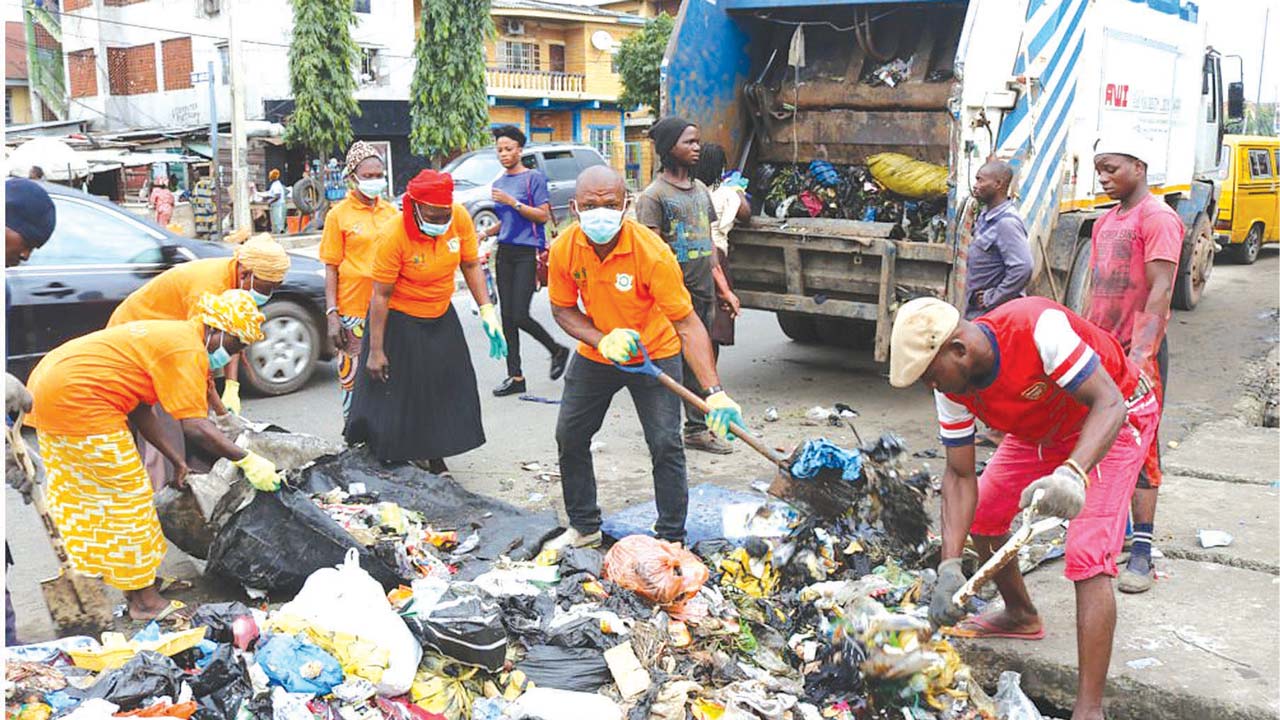Transforming sanitation in Nigeria’s public spaces
I had the opportunity to visit a number of Nigerian cities in recent weeks, from Lagos to Yenegoa, through Benin, and Warri. Although these cities provided rich cultural experiences and stunning scenery, one prevalent problem that caught my attention was the condition of public sanitation, especially in motor parks and markets. The unpleasant stench, overflowing […]

FILE PHOTO: Monthly environmental sanitation exercise
I had the opportunity to visit a number of Nigerian cities in recent weeks, from Lagos to Yenegoa, through Benin, and Warri. Although these cities provided rich cultural experiences and stunning scenery, one prevalent problem that caught my attention was the condition of public sanitation, especially in motor parks and markets. The unpleasant stench, overflowing trash, and unhygienic conditions of many of these areas confirmed the urgent need for significant improvements in sanitation in Nigeria’s public parks and markets.
In commemoration of World Toilet Day 2024, a global observance dedicated to raising awareness about sanitation, it is time to reflect on the need for cleaner, healthier environments in our communities, especially in places where large numbers of people gather. World Toilet Day, commemorated annually on November 19, highlights the critical issue of global sanitation and aims to ensure that everyone, everywhere, has access to safe and clean toilets.
This year’s theme, ‘Toilets – A Place for Peace’, underscores the connection between sanitation and the broader goal of peace and well-being. While it may seem like a simple issue, access to proper sanitation is a fundamental human right that remains out of reach for millions around the world, including in Nigeria. With rapid urbanisation, population growth, and the increasing movement of people in and out of public spaces, the absence of adequate sanitation facilities has become an even more pressing issue.
In Benin and Warri, overcrowded motor parks and markets often lacked basic sanitation facilities, forcing people to resort to open defecation or dispose of waste improperly. The unpleasant odours that emanated from these places were a stark reminder of the poor waste management systems in place and the lack of public toilets.
- Sit-at-home order: Gunmen kill vigilantes, burn vehicle in Anambra
- Tinubu arrives Brazil for G20 Summit
In motor parks, from which millions of people travel, the absence of functioning restrooms makes the experience less enjoyable and even unhealthy. In markets, where tens of thousands of people shop and interact daily, the lack of toilets is not just a matter of convenience—it’s a matter of public health and dignity. Poor sanitation contributes to the spread of diseases such as cholera, typhoid, and dysentery, which are prevalent in many parts of Nigeria due to inadequate waste management systems.
World Toilet Day 2024 calls on governments, organisations and individuals to take urgent action to address the sanitation crisis. In line with this year’s theme, I’d like to say that sanitation is not just about hygiene; it’s about health, safety and human rights. Without access to toilets, people are forced to endure the indignity of open defecation, which often leads to contamination of water sources, the spread of diseases, and, in some cases, even violence or exploitation.
While the challenges of inadequate sanitation in public spaces are significant, practical, achievable solutions exist that can help address this issue.
Firstly, private-public partnership (PPP); Yes, partnerships between the government and private businesses to build and maintain public toilets will jumpstart progress. These partnerships can include companies specialising in sanitation and waste management, offering their expertise and resources to ensure that toilets are clean, functional, and regularly serviced.
Secondly, the government should provide incentives for the construction of affordable, sustainable public toilets. These toilets should be accessible to all, regardless of socioeconomic status, and placed strategically in motor parks, markets, and other public spaces. The focus should be on maintaining hygiene standards, and ensuring toilets are well-kept and functional.
Thirdly, local communities should be encouraged to take ownership of sanitation in their areas. This can include setting up volunteer groups to monitor and clean public toilets or establishing waste management campaigns to raise awareness of the importance of keeping public spaces clean. Community engagement can go a long way in changing attitudes towards sanitation and ensuring that facilities are used properly. Community Development Associations (CDAs) should come into play here.
In addition, to complement the construction of toilets, there must be a concerted effort to improve waste management. Proper waste collection, disposal, and recycling systems ensure that public spaces remain clean. Local governments should invest in infrastructure that makes waste disposal easy and efficient, reducing the likelihood of littering and improper disposal. Cart pushers, who dump refuse indiscriminately, must be addressed here.
Moreover, raising awareness about the importance of sanitation and the need for better facilities in public spaces is critical. The government, NGOs, and community organisations must work together here. We must consider innovative solutions such as composting toilets, bio-digesters, mobile toilets and other water-saving systems.
Again, the theme, ‘Toilets – A Place for Peace’, reminds us that sanitation is not just about hygiene, but about providing dignity and safety to everyone.
The time to act is now. Our motor parks, markets, and public spaces can and must be transformed into places that promote health, dignity, and peace. By prioritising sanitation in these spaces, we can take a significant step towards addressing Nigeria’s sanitation crisis and improving the quality of life for all its citizens.
Eromosele, a corporate communication expert, can be reached via: [email protected]
